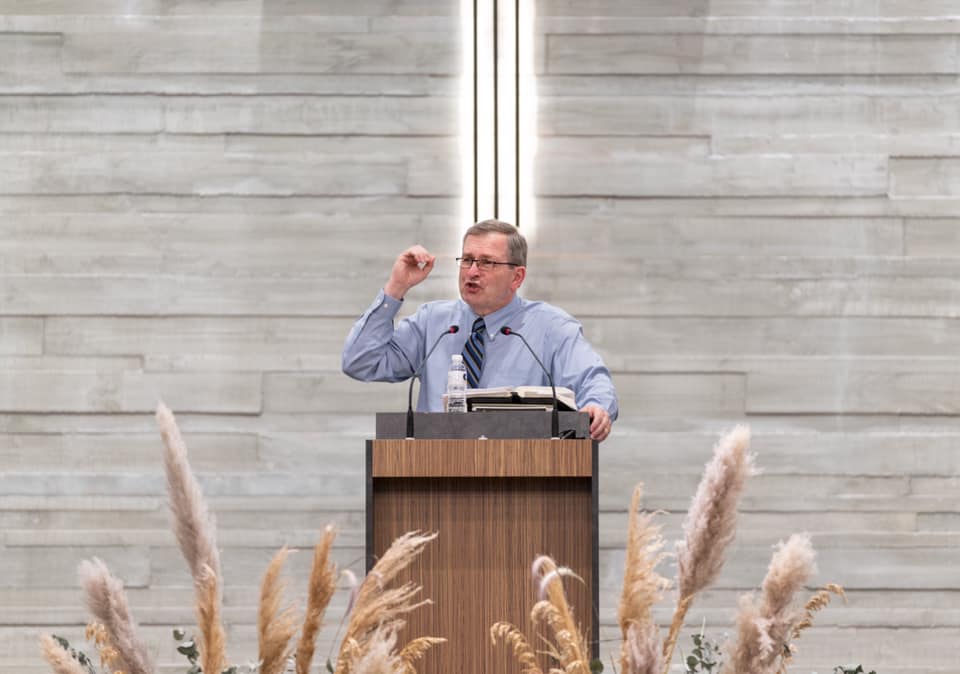“Was God angry with us before we came to Christ?” and other burning questions answered by Dr Joel Beeke
by Rachel Phua // September 2, 2019, 2:36 pm

The centrality of the Gospel underscored the Reformation Today 2019 conference from July 31 to August 2. Photo by Johannes Plenio on Unsplash.
One can never hear the Gospel too many times, and one never “graduates from the Gospel”, because it encompasses everything we understand about Christianity, said Dr Joel Beeke, reformed theologian and president of the Puritan Reformed Theological Seminary in Michigan.
The centrality of the Gospel underscored all his messages at the Reformation Today 2019 conference from July 31 to August 2 at Grace Baptist Church.

Dr Joel Beeke, the president of the Puritan Reformed Theological Seminary and a pastor, spoke over three days at this year’s Reformation Today conference. Photo from Reformation Today 2019’s Facebook page.
Dr Beeke pointed out that the foremost thing God demanded was that we love God with all our heart, soul and mind, and love our neighbours as ourselves (Exodus 20:3; Matthew 22:36-40).
However, our nature being sinful (Romans 5:12), we will never be able to fulfil this law, not just through the deeds we commit, but also by “sins of omission – omitting the things we ought to do”, he explained.
By coming as man, yet completely sinless, Jesus obeyed the law perfectly (Hebrews 4:14-15) and died for our sins on our behalf (Hebrews 9:28). We are justified by putting our faith in Christ alone (Acts 4:12).
That’s why we are sons and daughters
Over three nights, Dr Beeke discussed how justification informs the way we think of identity, suffering, power, evangelism and death.
Being justified by God means that we identify as sons and daughters of God, and we can stand before God without fear or feeling unworthy.
Justification is the “shield from all the fiery darts of the wicked”.
When it comes to trials, justification helps us understand that we go sometimes go through afflictions not because we sin, but because the Father has more to teach us (James 1:2-4; Hebrews 12:6). We can rejoice in our tribulations because they produce perseverance and hope (Romans 5:3-4).
“He’s so determined to make me holy that He’ll send me just the (right) amount of tribulations I need to cast me completely dependent on Him,” he noted.
Justification is also the “shield from all the fiery darts of the wicked” as well, he said. We can tell Satan that if he wants to get to us, he has to get to Jesus first. But Jesus is way above him (Mark 1:27), and we are in Christ.
And to a world that strives to find love and purpose and power on their own futile efforts (Genesis 3:16-19), justification is a hope-filled message in which God has done the work for us.

About 400 people attended the conference every night. Photo from Reformation Today 2019’s Facebook page.
In the final days, justification gives us the assurance to die peacefully, Dr Beeke said, as God’s children know that they have the passport to enter heaven after death.
Was God angry with us?
After his lecture on each night, Dr Beeke answered wide-ranging questions from the audience. Here is a selection of responses from the three nights:
1. How do I hate sin yet not condemn myself?
When you hate sin, you do condemn yourself and say I’m a hell-worthy sinner. But we must flee to Christ – read about Him, think about Him, fill your mind and heart with Him, and ask for grace and strength, then you won’t condemn yourself wrongly because you see yourself in Christ.
2. How did God view believers before we came to Christ? Was He angry with us (John 3:36)?
This is a challenging question, because on one side God loves us with an everlasting love. On the other side, the Bible says we are children of wrath until we are born again.
God still is displeased with us in our unregenerate state because we are not in Christ. And He hates sin with a holy hatred. But He is determined to fulfil His eternal love for us.
3. Some people may feel it was unfair that Adam’s sin was imputed to us. How do we respond?
By telling them we would have done the same thing had we been in Adam’s shoes.
There was only one tree in the garden they couldn’t eat of. Adam ate of it.
No one says it’s unfair that Christ – the second Adam – died for me, but everyone wants to keep guilt far away from them.
4. Grace of the Gospel vs cost of discipleship: How do we reconcile them?
When grace conquers you, grace is free in the sense that you didn’t have to contribute anything to receive grace. It’s not free in the sense that Jesus had to contribute everything – He suffered and died for you.
“When you get married to someone, does it cost you? Of course it does.”
When you receive the grace of the Gospel, it transforms your whole life, so that your comfort is that you don’t belong to yourself anymore, but you belong to Jesus Christ.
When you become his disciple out of gratitude, it costs you everything. It costs you your whole identity. You are now a new creation. The things you hated before you now come to love. The things you loved before you now come to hate. But it’s a cost you are very willing to pay.
Think about marriage. When you get married to someone, does it cost you anything? Of course it does. You have another person to care for. But because you’re in love, it’s a price you’re willing to pay.
Even more so, when you become Jesus’ disciple, it costs you everything because He’s not just an equal partner, He’s your Lord.
5. Am I an unprofitable servant (Matthew 25)?
This is a tough question because the more fruit you produce, the more you multiply your gifts, the more you’ll realise how little you’ve done for the Lord.
“Make me useful and make me fruitful today.”
When you talk to people who think they know a lot about something, they actually only know a little bit. The more you know about something, the more you realise how little you know.
I think you just have to be honest before God and say, “Lord I’m not what I want to be, but by the grace of God I’m not what I once was. Please help me and please help me take my few fish and slices of bread and multiply them.”
There are not a lot of prayers I pray every single day but every single morning I just ask the Lord: “Make me useful and make me fruitful today.”
We are an independent, non-profit organisation that relies on the generosity of our readers, such as yourself, to continue serving the kingdom. Every dollar donated goes directly back into our editorial coverage.
Would you consider partnering with us in our kingdom work by supporting us financially, either as a one-off donation, or a recurring pledge?
Support Salt&Light


